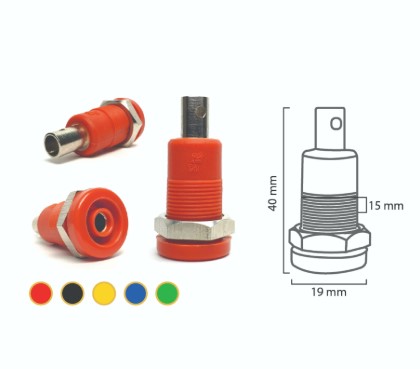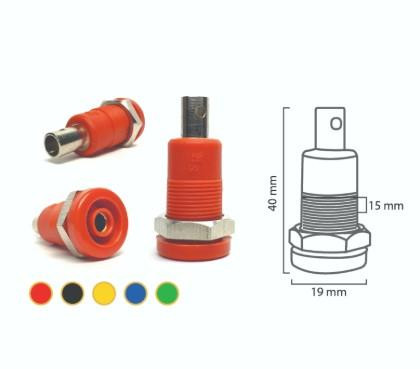Introduction
When it comes to electrical testing and measurements, precision and reliability are paramount. Whether you're troubleshooting circuits, measuring voltage, or testing resistance, having the right tools can make all the difference. Two of the most commonly used tools in electrical diagnostics are banana connectors and multimeter probes. These essential components are designed to provide secure connections and accurate readings, making them indispensable for both professionals and hobbyists in the electronics and electrical fields. In this article, we'll dive into what banana connectors and multimeter probes are, how they work, and why they are crucial for effective electrical testing.
What Are Banana Connectors?
Banana connectors are a type of electrical connector commonly used in test equipment, such as multimeters, power supplies, and oscilloscopes. They are named for their banana-shaped, flexible plugs that make it easier to insert and remove connections from various devices.
Key Features of Banana Connectors:
Shape and Design
Banana connectors have a cylindrical shape with a slightly curved or tapered end, resembling the shape of a banana. This shape ensures a secure and reliable connection when inserted into corresponding banana jack sockets, which are found on most test equipment.
Variety of Sizes
Banana connectors come in different sizes, with the most common being the 4mm diameter. Some connectors also feature different colors, which can be used to signify polarity or function (e.g., red for positive and black for negative).
Durability and Safety
Most banana connectors are made from durable materials such as brass or nickel-plated copper, ensuring good conductivity and resistance to wear and corrosion. They often come with insulated coatings to prevent accidental shorts.
Types of Banana Connectors
Plug-to-Plug: These connectors are used to make direct connections between two devices.
Plug-to-Socket: This version connects the plug of a multimeter probe or another device to a compatible jack on a piece of test equipment.
Banana Clip: These are connectors that have a clip on the end, allowing users to attach them to wires or other components.
What Are Multimeter Probes?
Multimeter probes are the physical tools used to make contact with electrical circuits while performing tests with a multimeter. These probes are connected to the multimeter’s input terminals and are used for measurements like voltage, current, and resistance.
Key Features of Multimeter Probes:
Types of Probes
Test Probes: These are the standard probes with pointed tips that make contact with circuit points for measurements.
Alligator Clips: These are similar to test probes but come with a spring-loaded clip at the end. They are useful when you need to make hands-free connections or need to hold the probe in place for extended periods.
Material and Design
Multimeter probes are often made of flexible, insulated wire with rubber or plastic casings for safety and comfort during use. The probe tips are usually made of metal (such as steel or brass) for excellent conductivity.
Length and Reach
Probes typically come with wires of varying lengths, with longer wires offering greater reach, especially when testing larger or more complex systems. This ensures that the user can work from a safe distance while maintaining accurate measurements.
Color-Coded for Polarity
Just like banana connectors, multimeter probes are typically color-coded (red for positive and black for negative) to help users easily identify the polarity and ensure proper connections for safe testing.
How Banana Connectors and Multimeter Probes Work Together
Banana connectors and multimeter probes complement each other in the process of electrical testing. The multimeter probes usually have banana plugs at their ends, which are inserted into the multimeter’s input jacks. The opposite end of the probe is used to make contact with the circuit or component being tested.
By combining banana connectors and multimeter probes, you can:
Ensure Secure Connections: The banana connectors provide a reliable, stable connection that minimizes the risk of loose connections or shorts during testing.
Test Various Electrical Parameters: With the appropriate probes, users can test voltage, current, resistance, and continuity, providing a comprehensive diagnostic tool for circuit analysis.
Expand Testing Capabilities: Through the use of adapters or different probe tips, users can test a wide variety of components and circuits with precision.
Why Are Banana Connectors and Multimeter Probes Essential?
Accuracy
Accurate electrical measurements are critical for troubleshooting and diagnostics. The secure connection provided by banana connectors ensures that the signals sent between the test equipment and the circuit under test are precise, reducing the likelihood of erroneous readings.
Versatility
Banana connectors and multimeter probes are versatile tools that can be used in a wide range of applications, from home electrical repairs to advanced laboratory work. The ability to quickly swap out probes or adjust the connection type gives users flexibility when working with different devices.
Safety
The insulated design of both banana connectors and multimeter probes ensures that the user is protected from accidental electric shocks. The probes are designed to make contact only with the points necessary for testing, preventing exposure to live parts that could cause harm.
Convenience
The ease of use provided by color-coded connectors and probes, as well as the straightforward interface between the tools and testing devices, makes these components incredibly user-friendly. They allow both beginners and professionals to efficiently and safely perform electrical tests.
Conclusion
Banana connectors and multimeter probes are vital tools for anyone involved in electrical testing, whether it's for troubleshooting household circuits or performing detailed analyses in an engineering lab. Their combination of flexibility, safety, and precision makes them indispensable for accurate, reliable results. By understanding their functionality and choosing the right components for your needs, you can ensure that your electrical testing is both effective and safe.






Comments